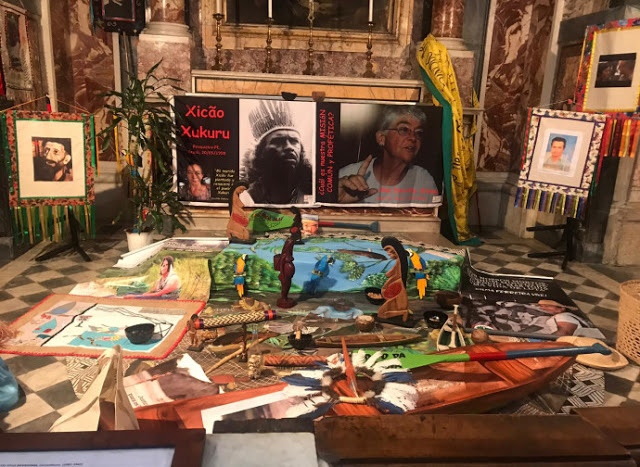With the staggering amount of fake news that makes its way around the Internet and social media these days, it’s difficult not to be sympathetic to critiques of journalists. Yet in the grand tradition of shooting the messenger, there have been some truly stunning efforts recently, by various figures in and around the Vatican, to make it appear that criticisms of Pope Francis and some of his dodgier moves during the current Amazon Synod are simply the scurrilous tactics of so-called “journalists without ethics.”
Earlier this week, for instance, Cardinal Óscar Maradiaga, who heads the pope’s cabinet-like group of cardinal advisors, in an interview with La Repubblica (the Leftist Italian newspaper preferred by the pope and the home of his eccentric sometime interlocutor Eugenio Scalfari), made several outrageous claims.
The Cardinal started by saying, “They [meaning mostly American journalists] want to discredit us, first by portraying us as in large part pedophiles, and now accusing us of financial laxness.”
It’s difficult to know who, precisely, he is referring to here because it’s not as if “they” are all of one mind. Journalistic outlets of all kinds, left and right, North and South American, indeed all over the globe, have only followed the evidence showing that, in addition to the small percentage of priests responsible for the vast majority of sex abuse cases, Vatican figures at the very highest levels have perpetrated abuse themselves or covered up abuse by others.
Indeed, on questions of sexual abuse, there’s very little difference between the uber-liberal New York Times and the most hard-line conservative Catholic news outlets.
And we’re only in the earliest stages of financial investigations that seem to point in the direction of what may be even bigger scandals in the Vatican. Again, mere ordinary reporting – whatever the source – cannot be brushed away with vague claims of bad faith. And note: Cardinal Maradiaga has had to deny that the Vatican might go bankrupt – the kind of denial that only makes you wonder more whether it’s true.
He went on to say that the latest rounds of news stories “have the objective of destabilizing, whether it’s the [Vatican] Gendarmeria or the Church Herself at this moment of the Synod.”
But Maradiaga is clearly counting on a sympathetic interviewer in a paper close to pope Francis. Because the most routine investigations into the facts themselves have turned up things that are quite troubling.
Last week, the Vatican fired the chief of the Gendarmeria, its security force, General Domenico Giani, allegedly because of the brusque way in which he invaded some Vatican financial offices, apprehending five employees and removing them from the premises.

The official explanation has been that the rough handling -and the leaking of the identities of the five people involved before it was determined whether they should be charged with crimes – offended Pope Francis. But there have been so many abrupt firings and removals in Church offices involving money that it’s difficult to believe that was all there was to it. Every time that anyone has gotten close to uncovering financial corruption, he’s ended up reassigned to other duties or fired.
And as if these efforts at misdirection weren’t enough. Maradiaga made the absurd, but often repeated claim in recent years, that there’s a sinister, capitalist funded American conspiracy against Pope Francis: “Part of the U.S. Church pretends that Francis’s encyclical on ecology doesn’t exist; they prefer donations from the oil companies.”
This is a charge so slanderous, so ridiculously lacking in factual foundation that it’s hard to believe that it’s repeated lazily in certain sectors of the Italian and world press.
Just at the level of the literal meaning of words, if you’re going to condemn what the old Communists called the “running dogs of capitalism,” the least you can do is properly identify which dogs are doing the running.
I think I know personally most of the people that Maradiaga thinks he’s tarring and feathering with such charges. And none of them are remotely in the pay of oil companies.
The funding behind the sources he probably thinks most unfair may come from groups like the Knights of Columbus (insurance), pizza franchises (Domino’s), real estate developers, or other successful businessmen – to say nothing of generous readers and viewers.
But it shows a certain lack of imagination and moral laziness on the part of a prince of the Church – well-traveled in international circles, by the way – to think that he can get away with the usual charge: that it’s those devils who pump that black gooey stuff and sell it for money – because, well, because everyone knows oil companies are evil. And must be behind our critics.
Meanwhile, a similar move has appeared in a German publication, claiming that there is a whole cabal of journalists uninterested in truth and only raising questions to discredit the pope and the whole synodal process.
For such people, for example, the figurines that have been – rightly or wrongly – dubbed Pachamama, and have produced outrage over pagan elements entering sacred spaces, were quite harmless. Almost of no interest. It was only the bigoted reporting by “journalists without ethics” – and of course “racism,” “xenophobia,” and “fanaticism”- that turned those images into something disturbing to serious Catholics around the globe.
Predictions are hard, especially – as Yogi Berra may or may not have said – about the future. But if you wanted to place a bet, the stories about Roman corruption and malfeasance are not going to go away. And the silly attempts to make it appear that serious criticism is only fake news, circulated by people in the pay of oil companies or other nefarious actors, will inevitably show themselves to be the biggest falsehoods of all.















